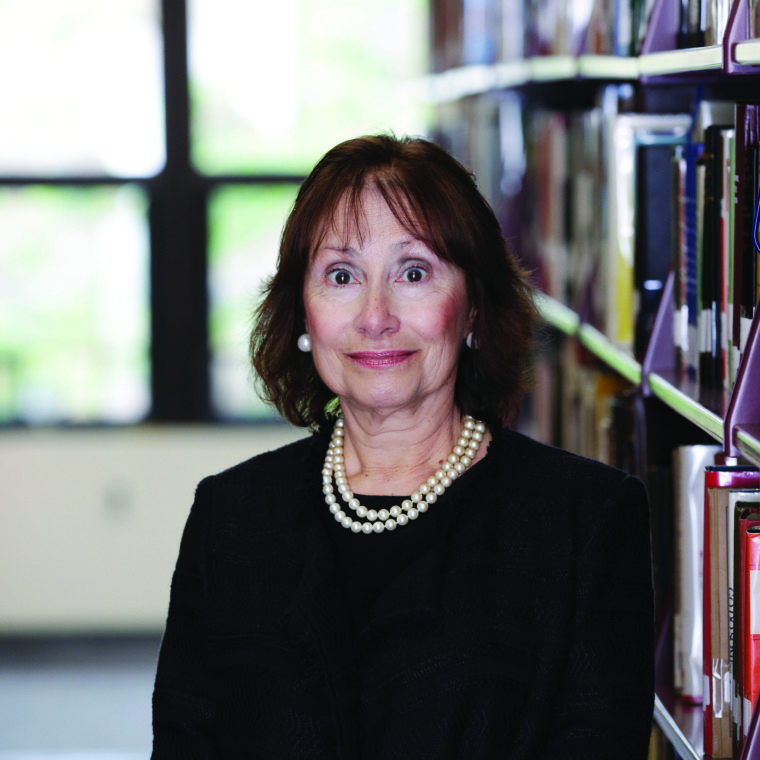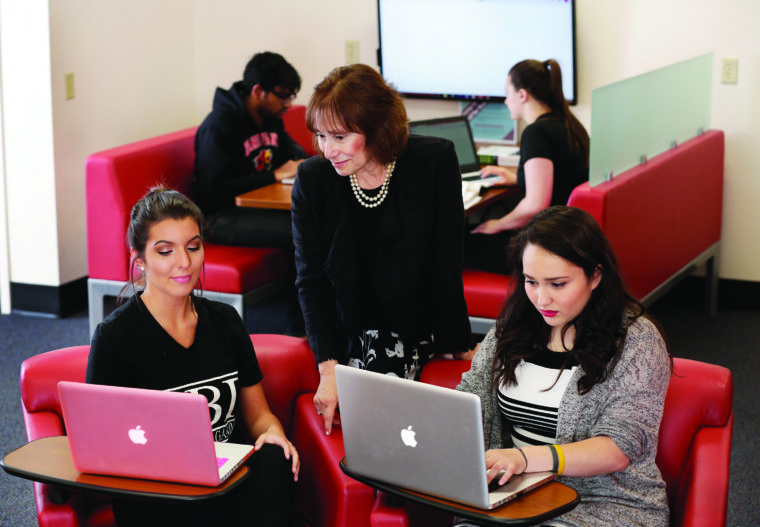Caldwell University
September 1, 2016
Marie Mullaney: A father’s love of politics and newspapers sparks a daughter’s passion for history

Marie Mullaney remembers that her father, a Newark schoolteacher, loved politics and reading newspapers. “We had newspapers all over the house,” she says. As a child, she would accompany her father to Asbury Park not to go to the beach but to sit in “a newspaper office” that had publications from all over the country. There her father devoured the papers and Mullaney learned to love the world of history and politics. “I had this phenomenal interest.”
Her zeal for history grew as she attended Catholic schools in Newark. When she was in third grade she couldn’t wait to enter fourth grade, which had a social studies curriculum. In eighth grade she wound up memorizing her history book “because I kept reading it and reading it.” And then there was the 1968 presidential election. She recalls the television coverage starting at 2 p.m. and continuing all day. “I was fascinated by the whole process and certainly by Nixon’s story.”
But Mullaney never thought she’d pursue history professionally. “My father kept telling me, ‘You need to get a job.’” With an aptitude for math, she started out in college as a math major, but by the end of her first semester in freshman year, she knew her heart was not in it. She switched to political science until she had a revelation in her international relations class. “I became furious with the instructor and the textbook,” realizing that all of it was “garbage.” Quite simply, she says, “You can’t study political science without knowing history, especially in international relations.”
This “aha” moment shaped her direction. “You needed history before you can get to any sort of theoretical analysis. History is just the fountain of truth.” She graduated from Seton Hall summa cum laude as valedictorian with a double major in history and political science. She always thought she’d go to law school and was accepted into several including Harvard. But her college history professors encouraged her to go to graduate school and to apply for the prestigious Danforth Foundation Fellowship. Mullaney was one of only 65 students nationwide selected to receive the scholarship. “Here I was with all these law school acceptances.” After two weeks in law school, she did a 180 and decided to pursue her passion for history, enrolling in graduate school at Rutgers University in New Brunswick. She was a scholar in feminism, interested in women who were rebels against their societies and in Marxism. “(It’s) actually ironic because I’m a very politically conservative person,” she says.
Realizing how “horrible” the job market was for history students, Mullaney was driven to complete her master’s and her Ph.D. in 4½ years, breaking all kinds of records for her age. “That fear pushed me like you would not believe.” While she was finishing her Ph.D., Rutgers put out a brochure highlighting its upcoming graduates. Caldwell College saw it and hired her as an adjunct to teach a women’s history course. Not long after, she was offered a full-time teaching job. “No search committees; I suppose they checked my references. I don’t know. I was a good Catholic girl,” she says.
Seeing Caldwell’s growth has been most gratifying for Mullaney. She came to Caldwell when it was a small women’s institution. “That was great. I’m still in contact with some of the students. Those were special days, those early years.”
In the 1980s, she was on the committee to determine whether the institution should go coed. Since she had taught at Douglass College, which was then the undergraduate women’s college at Rutgers University, and had studied the history of women’s colleges, she knew it was time for Caldwell to transition.
Her contributions to Caldwell’s growth are numerous—chairing the History Department for 21 years, bringing the history honor society Phi Alpha Theta to campus, creating the political science major, overseeing the department during curriculum revision and the creation of the senior outcomes assessment research process and serving on the Faculty Council as secretary for many years. She returned to work after having each of her three children. After giving birth to her oldest, she was back on campus four days later for graduation.
As a professor, Mullaney has stretched and grown. At the beginning, “We had to teach everything. You would laugh if you knew some of the courses I have taught.” She appreciates being in an environment where professors and teachers can grow and develop. “If I were at a larger institution, I would be stuck teaching whatever specialty I developed in graduate school.” Her Ph.D. is in European history, but her passions have expanded; she loves teaching Western civilization and a range of courses on American history. Her more recent research interests have involved the history of the Catholic Church, and she has created two courses on the topic for the enriched core. “I love the flexibility we are given. If you have an idea, if you have a talent, if you have a desire, you are allowed to run with it, and I think that is terrific.”
Mullaney calls herself “neurotically organized” and has used that attribute to help the university reach lofty goals. Since 1985 she has played a pivotal role in Caldwell’s Middle States reaccreditation processes, chairing the curriculum work group in 1985 and the entire steering committee in 1995. Along with President Nancy Blattner, the board of trustees and the cabinet, she led the most recent Middle States effort in 2015. While most would be happy to be done and to take a rest after a three-year process involving massive documents, just weeks after the completion, Mullaney was heard saying how she missed Middle States. “I loved doing Middle States. You want to help the university, and I’m a historian, a storyteller. We use documents and we support what we say with facts and evidence.”
She makes to-do lists all the time, often on pieces of paper. “I don’t need a fancy computer or smartphone… I get things done. You want something done, give it to me.” But she admits that her “driven” personality can sometimes be tough, even for herself.
Her two sons and one daughter were all swimmers and always knew their mother was there for them. “My daughter said, ‘My mother was at every swim meet.’” She was class mother, involved in her kids’ school committees, and ran “gigantic” parties for her children. “I wound up in the hospital one year with pneumonia for doing that,” she says.
Still, Mullaney says she is most grateful to God for giving her a family and “the health and energy” to do what she has done.
Building relationships with students and keeping in contact with them have been most gratifying. “The history students are the greatest. They become teachers themselves. They ask me for help,” she says.
Mullaney spent a recent sabbatical researching the history of the Katherine Gibbs schools, and she is excited about being able to develop new courses. “After so many years of juggling work and children, I feel even more intellectually alive than I did when I was in graduate school. And it’s a great feeling.”
— CL
“You can’t study political science without knowing history, especially in international relations.”

THINGS YOU MIGHT NOT KNOW ABOUT MARIE MULLANEY
If you are talking to her when she is home, it is not unusual for her to say, “Hold the phone. I have to get the cookies out of the oven.”
“I love to decorate. I love to cook. I’m like Martha Stewart with a Ph.D. I cook dinner five nights a week. One of my side specialties is the history of food.”
She is a voracious reader. “In my house I have thousands of books in my collection. To quote Thomas Jefferson, ‘I cannot live without books.’”





